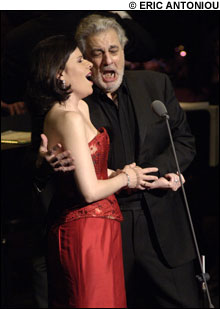
GIVE THEM ZARZUELA: The best of the duets with Ana María Martínez was the one from Manuel Penella’s El gato montés. |
The last time I saw Spanish tenor Plácido Domingo — well, the last time I saw him was at a press conference this past Friday evening at the Taj Hotel, where he charmed a contingent of some 30 journalists with his modesty and good humor. But the last — and in fact the only — time I had seen him on stage was at the Met in February 2000, where he sang Danilo to Frederica von Stade’s Hanna in the Met’s first ever production, in English, of Franz Lehár’s Die lustige Witwe (The Merry Widow). It was a stolid, unengaging affair: Domingo and Stade couldn’t even manage to waltz with conviction. (John Simon’s New York magazine review was headlined, “Some Like It Tepid.”) He did better — waltzing, at least — with Puerto Rican soprano Ana María Martínez at the Wang Theatre, where last Monday his current “Around the World” tour made its first American stop.The tour itself is a puzzle: a press release described Boston as “one of only three U.S. performances,” but the other two have yet to be identified, and it seems that “Around the World” is really just whatever turns up on Domingo’s worldwide concert schedule. He had been scheduled to make his “first-ever full concert appearance in Boston” last September 28, at the TD Banknorth Garden, but the date was scrubbed after the death, on September 6, of fellow superstar Luciano Pavarotti. Some wondered whether soft ticket sales could have encouraged the cancellation. In the event, the concert was rescheduled for the smaller Wang Theatre, even though the Garden seems to have been available Monday night. Top price was $250, and the orchestra, at least, was pretty well filled, amid reports of people outside begging for tickets. Domingo was joined by his protégée Martínez (she won his Operalia Competition in 1995) plus veteran conductor Eugene Kohn leading a full-sized (I counted 40 strings) local pick-up ensemble — “Symphony Orchestra, Boston” — among whose members one could spot many familiar Boston Ballet Orchestra faces.
No mystery about the program: opera arias in the first half of the evening, operetta, Broadway, and zarzuela (Spanish operetta) in the second, the two soloists alternating and occasionally duetting. The orchestra, its violins massed rather than divided into firsts and seconds, led off with the Rákóczi March from La damnation de Faust, a performance that was barely recognizable as Berlioz. Perhaps it was the Wang’s sound system that turned this showpiece into a concerto for violins and percussion — Berlioz’s tart inner strings were inaudible. But Kohn was responsible for the unidiomatic line, operatic rather than insinuating. The 67-year-old Domingo came out in an informal outfit — black shirt, black trousers, black jacket — that put the spotlight on his pleasingly weathered face and gray hair and began with “Ô souverain, ô juge, ô père” from Massenet’s Le Cid, dedicating the number to Pavarotti, moving from one of the two mics to the other, singing with power and religious fervor.

Martínez came out bare-shouldered in a blackening-rioja evening dress and did the Jewel Song (“Ah, je ris de me voir si belle”) from Gounod’s Faust; she has a strong, almost severe, soprano, with a low center, full at the top but not bright or blooming, and without Marguerite’s wonder at finding the casket of jewels. Domingo then sang the “Lamento di Federico” from Cilea’s L’Arlesiana, leaning into his Italian consonants with the requisite slancio, and Siegmund’s “Winterstürme wichen dem Wonnemond” from Wagner’s Die Walküre, a heldentenor number that lacked both youthful vigor and heroic line; in between Martínez offered an aristocratic “Un bel dí vedremo” from Puccini’s Madama Butterfly. The Overture to Les vêpres siciliennes followed, Kohn no more idiomatic in Verdi, and then the “Cherry Duet,” “Suzel, buon dí,” from act two of L’amico Fritz (an opera the program credited to Cilea rather than Mascagni). Everything was gorgeously sung, but it all sounded the same, straight out of Generic Opera Superstar 101. Martínez didn’t even succeed in swinging her shoulders in time with the orchestra.
After a brief intermission, Domingo sang “Dein ist mein ganzes Herz” from Lehár’s Land des Lächelns, confirming what I didn’t like about his Danilo: his voice has no subjunctive, and that’s what Viennese operetta is all about. Martínez, now in a flame gown, followed with the “Vilja-Lied” from Die lustige Witwe, her Pontevedro a land of great beauty but few smiles. Domingo did “Some Enchanted Evening” from South Pacific and Martínez “I Could Have Danced All Night” from My Fair Lady before they duetted on West Side Story’s “Tonight.” They’re not Broadway singers: they wait for the big orchestral swells instead of making every note — and every word — count. (“Across a crowded room” got lost in the “crowd.”) But the orchestra sounded more comfortable in the Overture to Bernstein’s Candide, and so did the singers in the zarzuela selections, Domingo more natural in “Amor, vida de mi vida” from Federico Moreno Torroba’s Maravilla and “No puede ser” from Pablo Sorozabal’s La tabernera del puerto, Martínez finally loosening up in her declaration “D’España vengo” from Pablo Luna’s El niño judío.